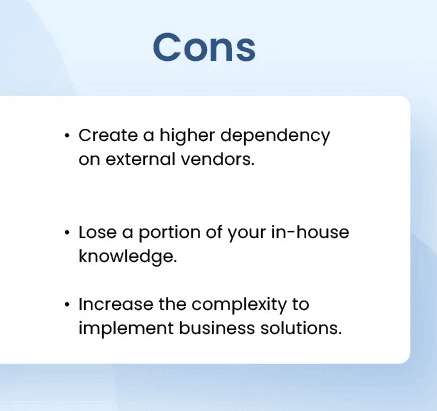A company hires another company or individual to perform certain tasks, functions, or processes that are typically done in-house by hiring a third party service provider. Outsourcing has become popular in today’s global economy, as businesses look for ways to cut costs, access specialized expertise, and increase efficiency.
This includes functions like:
- Manufacturing
- IT services
- Customer support
- Administrative tasks
Outsourcing has increased in popularity recently, particularly in the areas of IT services and customer support. As a result, many businesses off-shore certain tasks to developing countries like India, the Philippines, and other nations with lower labor prices.
This blog provides an overview scope of outsourcing and its drawbacks. By weighing the benefits and drawbacks of outsourcing and the achievements, businesses can decide whether to outsource and how to do so efficiently. Lastly, we will discuss factors to consider when outsourcing to help companies when scaling.
Pros of Outsourcing

Outsourcing can be highly beneficial to businesses, some of the pros includes:
- Cost Savings
One of the primary reasons businesses outsource is to save money. Outsourcing to locations where labor costs are lower can significantly reduce expenses related to salaries, benefits, and overhead.
- Access to Specialized Expertise and Technology
Outsourcing can provide access to expertise and technology that may not be available in-house. This can include specialized skills, advanced technology, and industry knowledge that can help businesses stay competitive.
- Increased Efficiency and Productivity
Outsource can help businesses increase efficiency and productivity by allowing them to focus on their core competencies while outsourcing non-core functions to experts in those areas.
- Greater Flexibility and Scalability
Outsourcing can provide businesses with greater flexibility and scalability to meet changing demands. Outsourcing allows businesses to easily ramp up or down their resources and adjust their operations as needed.
- Reduced risk and Liability
Outsource can help businesses reduce risk and liability by transferring certain responsibilities to the outsourcing companies. This can include legal and regulatory compliance, as well as liability related to product defects or other issues.
Overall, outsourcing can offer result driven benefits to businesses. Therefore, outsourcing should be considered to streamline their:
- Operations
- Increase efficiency
- Reduce costs.
Businesses can focus on their core competencies and allocate resources more effectively by outsourcing for their non-core functions.
Cons of Outsourcing

Businesses should carefully consider potential drawbacks when deciding whether to outsource and which functions to outsource. While outsourcing can offer many benefits, there are also potential drawbacks that businesses should consider. Some of the drawbacks of outsourcing are:
- Loss of Control over Business Functions
Outsourcing can result in a loss of control over certain business functions, as the outsourcing provider takes on those responsibilities. This can make it more difficult for businesses to manage and oversee those functions.
- Language and Cultural Barriers
Outsourcing to locations where the primary language is not English can create communication challenges and misunderstandings. Additionally, cultural differences may impact business practices and expectations.
- Quality Issues
If the outsourcing provider does not have the same standards or quality control measures in place as the business, it can result in quality issues. Thus, resulting in product defects which can damage the business’s reputation.
- Time Zone Differences and Communication Challenges
Outsourcing to locations in different time zones can create communication challenges and make it difficult to coordinate activities or resolve issues in a timely manner.
- Negative Impact on Local Employment
As businesses shift work to lower-cost locations, outsourcing can result in job losses in the local community. This can have a negative impact on the economy and the community.
Case Studies
Real-world examples of successful and unsuccessful outsourcing, can give us a better understanding of the pros and cons of outsourcing in detail. Here are some case studies:
Following are Examples of Successful Outsourcing:
1.Apple
Foxconn, a company based in Taiwan provides Apple with the function of production of its iPhones and other devices. Apple is able to reduce costs and increase production efficiency, while maintaining high quality standards, by outsourcing manufacturing to Foxconn.
2.IBM
IBM outsources many of its IT functions to third-party providers, while focusing on its core competencies to improve overall efficiency. IBM has been able to reduce costs and increase scalability, by outsourcing IT functions.
3.Nike
Nike outsources the production of its shoes to manufacturers in countries such as China, Vietnam, and Indonesia. By outsourcing production, Nike is able to take advantage of lower labor costs and access specialized expertise in shoe manufacturing.
Following are Examples of Unsuccessful Outsourcing:
1.Target
In 2013, Target experienced a major data breach that affected over 40 million customers. The breach was traced back to an HVAC vendor that Target had outsourced certain IT functions to. The outsourcing provider had weak security measures in place, which allowed hackers to gain access to Target’s network.
2.Boeing
Boeing outsourced a significant portion of the design and production of its 787 Dreamliner to third-party suppliers. However, this outsourcing strategy led to significant delays and quality issues, resulting in costly rework and repairs.
3.Dell
In the early 2000s, Dell outsourced its customer support to call centers in India. However, customers complained about language barriers and difficulty communicating with the call center representatives, leading to a decline in customer satisfaction.
These case studies illustrate the potential benefits and drawbacks of outsourcing, and highlight the importance of carefully considering outsourcing decisions and selecting outsourcing providers carefully
Factors To Consider When Outsourcing
When business is growing exponentially, outsourcing is a viable solution to help companies scale. There are certain factors to consider while outsourcing. These factors are explained in depth in blog-How outsourcing helps companies scale.







